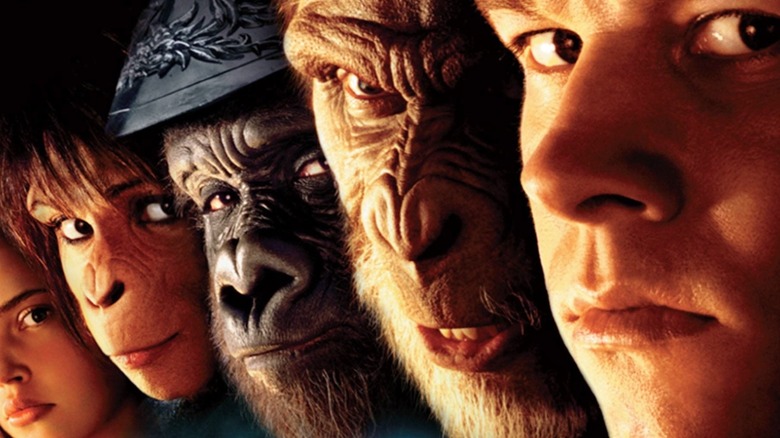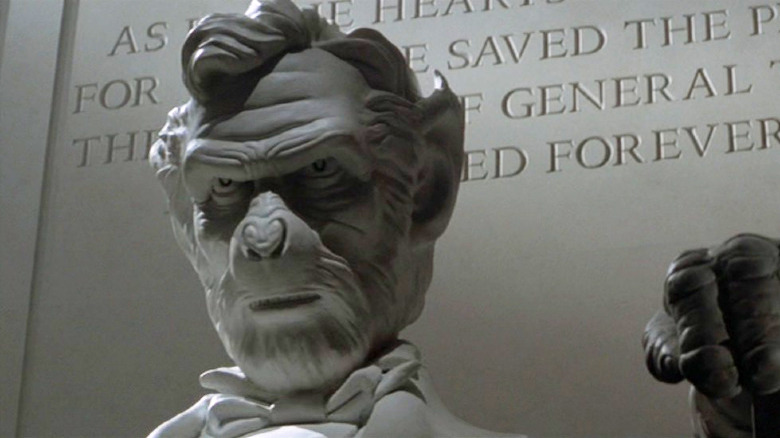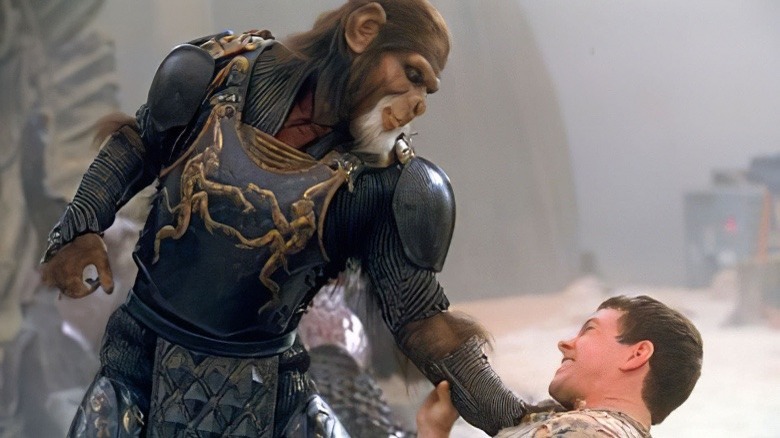The Alternate Planet Of The Apes Ending Tim Burton Wanted Us To See
Remember when people got excited about Tim Burton movies? Okay, that's a bit harsh, but most of the eccentric, gloomy director's work over the last 15 years or so has lacked the wild spark that his earlier, more outlandish films had, as well as the depth of his most mature yet equally peculiar offerings like "Ed Wood" and "Big Fish." Arguably the first signs of trouble arouse with Burton's "Planet of the Apes," a re-imagining of the classic 1968 sci-fi film and the 1963 book by Pierre Boulle that inspired it.
On paper, "Planet of the Apes" and Burton read as a perfect match. No, really! Both the 1968 movie and Boulle's novel are social satires that create a fantastical setting — one where apes have evolved into the dominant species and adapted the manners and customs of humans — that serves as a funhouse mirror for the real world, reflecting humanity's foibles back at them. It's similar to what Burton achieved to great effect with his visions of 1980s yuppie culture in "Beetlejuice" and the '90s' American suburbs in "Edward Scissorhands."
Upon its release in 2001, however, Burton's "Planet of the Apes" was a financial hit (grossing well over three times its $100 million budget) yet earned decidedly middling reviews. The film drew criticism for various reasons, most notably its muddled plot and confusing ending. But would the alternate conclusion Burton had in mind have been any better?
How Burton's Planet of the Apes Ended
Mark Wahlberg starred in "Planet of the Apes" as Leo, an astronaut from the year 2029 who gets tossed several centuries into the future after traveling through an electromagnetic storm in space and crash-lands on Ashlar, a planet ruled by apes that act like humans, speak English, and enslave people. In time, though, Leo finds the now-ancient remains of the Oberon, the space station where he worked. As Marky Mark deduces, the Oberon (which had a crew that included trained primates) also got pulled into the electromagnetic storm yet crashed on Ashlar millennia before he did because wibbly wobbly, timey wimey stuff.
With Ashlar's people being descended from the Oberon's human crew, just like the planet's apes evolved from its simians, they've retained their intellectual capabilities and are able to rally around Leo to rebel against General Thade (Tim Roth), a cruel ape warrior who's driven to keep the truth about Ashlar's history secret, lest his fellow apes perceive humans as their equals. So, a revolution in the bag, Leo heads back through the same electromagnetic storm and lands on Earth, only to discover the Lincoln Memorial is now a monument honoring Thade and humanoid apes rule the planet.
Does the ending make sense? Not really, but that's the point. It was meant to be a giant cliffhanger leaving the door open for a sequel, which would've then explained how Thade escaped Ashlar and got to Earth long before Leo returned.
How It COULD Have Ended
Burton's alternate ending to "Planet of the Apes" had Leo crash-landing in the Yankees' stadium, only to find the baseball team and onlookers are all humanoid apes. This conclusion would've hewed a little closer to the ending to Boulle's novel. There, the protagonist, a journalist named Ulysse Mérou, travels to Soror, a planet far, far away from Earth, where human-like apes rule over animalistic people. By the time Ulysse escapes and returns to Earth, many centuries have passed, and the world's apes have replaced humans as the dominant species. In an extra twist, the book also reveals the characters in its frame story, who are reading Ulysse's account of his journey, are actually gorillas.
Would the alternate ending have vastly improved Burton's film? Well, it might've restored some of the meaning of Boulle's original book, which acted as a cautionary tale about humankind's arrogance and belief in its inherent supremacy to other living beings. (The 1968 film's own twist ending also threw in a critique of the nuclear arms race.) That said, it doesn't skirt around the bigger issue, which is that Burton's "Planet of the Apes" tried to be a twisted sci-fi satire and straightforward action-adventure at the same time but wasn't fully satisfying as either of those things. In that regard, it's probably for the best the intended (threatened?) sequel never came to pass.


